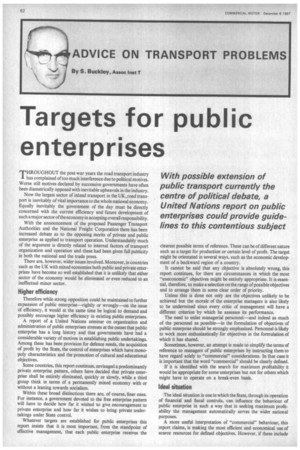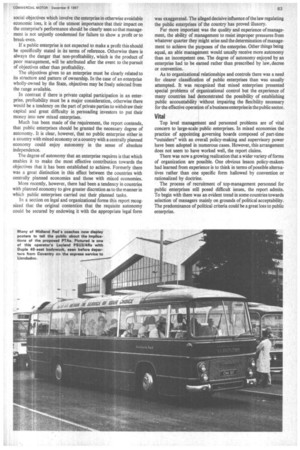Targets for public enterprises
Page 64

Page 65

If you've noticed an error in this article please click here to report it so we can fix it.
THROUGHOUT the post-war years the road transport industry I has complained of too much interference due to political motives. Worse still motives declared by successive governments have often been diametrically opposed with inevitable upheavals in the industry.
Now the largest sector of inland transport in the UK, road transport is inevitably of vital importance to the whole national economy. Equally inevitably the government of the day must be directly concerned with the current efficiency and future development of such a major sector of the economy in accepting overall responsibility.
With the announcement of the proposed Passenger Transport Authorities and the National Freight Corporation there has been increased debate as to the opposing merits of private and public enterprise as applied to transport operation. Understandably much of the argument is directly related to internal factors of transport organization and operation and these had been given full publicity in both the national and the trade press.
There are, however, wider issues involved. Moreover, in countries such as the UK with mixed economies both public and private enterprises have become so well established that it is unlikely that either sector of the economy would be eliminated or even reduced to an ineffectual minor sector.
Higher efficiency
Therefore while strong opposition could be maintained to further expansion of public enterprise—rightly or wrongly—on the issue of efficiency, it would at the same time be logical to demand and possibly encourage higher efficiency in existing public enterprises.
A report of a United Nations seminar on organization and administration of public enterprises stresses at the outset that public enterprise has a long history and that governments have had a considerable variety of motives in establishing public undertakings. Among these has been provision for defence needs, the acquisition of profit by the State, the control of enterprises which have monopoly characteristics and the promotion of cultural and educational objectives.
Some countries, this report continues, envisaged a predominantly private enterprise pattern, others have decided that private enterprise shall be entirely eliminated, quickly or slowly, while a third group think in terms of a permanently mixed economy with or without a leaning towards socialism.
Within these broad distinctions there are, of course, finer ones. For instance, a government devoted to the free enterprise pattern will have to decide how far it wished to give encouragement to private enterprise and how far it wishes to bring private undertakings under State control.
Whatever targets are established for public enterprises this report insists that it is most important, from the standpoint of effective management, that each public enterprise receives the clearest possible terms of reference. These can be of different nature such as a target for production or certain level of profit. The target might be orientated in several ways. such as the economic development of a backward region of a country.
It cannot be said that any objective is absolutely wrong, this report continues, for there are circumstances in which the most "uneconomic" objectives might be entirely appropriate. It is essential, therefore, to make a selection on the range of possible objectives and to arrange them in some clear order of priority.
Unless this is done not only are the objectives unlikely to be achieved but the morale of the enterprise managers is also likely to be undermined since every critic of management will have a different criterion by which he assesses its performance.
The need to enlist managerial personnel—and indeed as much of the personnel as possible—in the formulation of objectives of public enterprise should be strongly emphasized. Personnel is likely to work more enthusiastically for objectives in the formulation of which it has shared.
Sometimes, however, an attempt is made to simplify the terms of reference to managers of public enterprises by instructing them to have regard solely to "commercial" considerations. In that case it is important that the word "commercial" should be clearly defined. If it is identified with the search for maximum profitability it would be appropriate for some enterprises but not for others which might have to operate on a break-even basis.
Ideal situation
The ideal situation is one in which the State, through its operation of financial and fiscal controls, can influence the behaviour of public enterprise in such a way that in seeking maximum profitability the management automatically serves the wider national purposes.
A more useful interpretation of "commercial" behaviour, this report claims, is making the most efficient and economical use of scarce resources for defined objectives. However, if these include social objectives which involve the enterprise in otherwise avoidable economic loss, it is of the utmost importance that their impact on the enterprise's performance should be clearly seen so that management is not unjustly condemned for failure to show a profit or to break-even.
If a public enterprise is not expected to make a profit this should be specifically stated in its terms of reference. Otherwise there is always the danger that non-profitability, which is the product of poor management, will be attributed after the event to the pursuit of objectives other than profitability.
The objectives given to an enterprise must be clearly related to its structure and pattern of ownership. In the case of an enterprise wholly-owned by the State, objectives may be freely selected from the range available.
In contrast if there is private capital participation in an enterprise, profitability must be a major consideration, otherwise there would be a tendency on the part of private parties to withdraw their capital and great difficulty in persuading investors to put their money into new mixed enterprises.
Much has been made of the requirement, the report contends, that public enterprises should be granted the necessary degree of autonomy. It is clear, however, that no public enterprise either in a country with mixed economy or a country with a centrally planned economy could enjoy autonomy in the sense of absolute independence.
The degree of autonomy that an enterprise requires is that which enables it to make the most effective contribution towards the objectives that it has been established to achieve. Formerly there was a great distinction in this effect between the countries with centrally planned economies and those with mixed economies.
More recently, however, there had been a tendency in countries with planned economy to give greater discretion as to the manner in which public enterprises carried out their planned tasks.
In a section on legal and organizational forms this report recognized that the original contention that the requisite autonomy could be secured by endowing it with the appropriate legal form was exaggerated. The alleged decisive influence of the law regulating the public enterprises of the country has proved illusory.
Far more important was the quality and experience of management, the ability of management to resist improper pressures from whatever quarter they might arise and the determination of management to achieve the purposes of the enterprise. Other things being equal, an able management would usually receive more autonomy than an incompetent one. The degree of autonomy enjoyed by an enterprise had to be earned rather than prescribed by law, decree Or convention.
As to organizational relationships and controls there was a need for clearer classification of public enterprises than was usually attempted. It was recognized that mixed enterprises presented special problems of organizational control but the experience of many countries had demonstrated the possibility of establishing public accountability without impairing the flexibility necessary for the effective operation of a business enterprise in the public sector.
Vital
Top level management and personnel problems are of vital concern to large-scale public enterprises. In mixed economies the practice of appointing governing boards composed of part-time "outsiders" with an overall policy-maldng and supervisory power have been adopted in numerous cases. However, this arrangement does not seem to have worked well, the report claims.
There was now a growing realization that a wider variety of forms of organization are possible. One obvious lesson policy-makers had learned from experience is to think in terms of possible alternatives rather than one specific form hallowed by convention or rationalized by doctrine.
The process of recruitment of top-management personnel for public enterprises still posed difficult issues, the report admits. To begin with there was an evident trend in some countries towards selection of managers mainly on grounds of political acceptability. The predominance of political criteria could be a great loss to public enterprise.








































































































